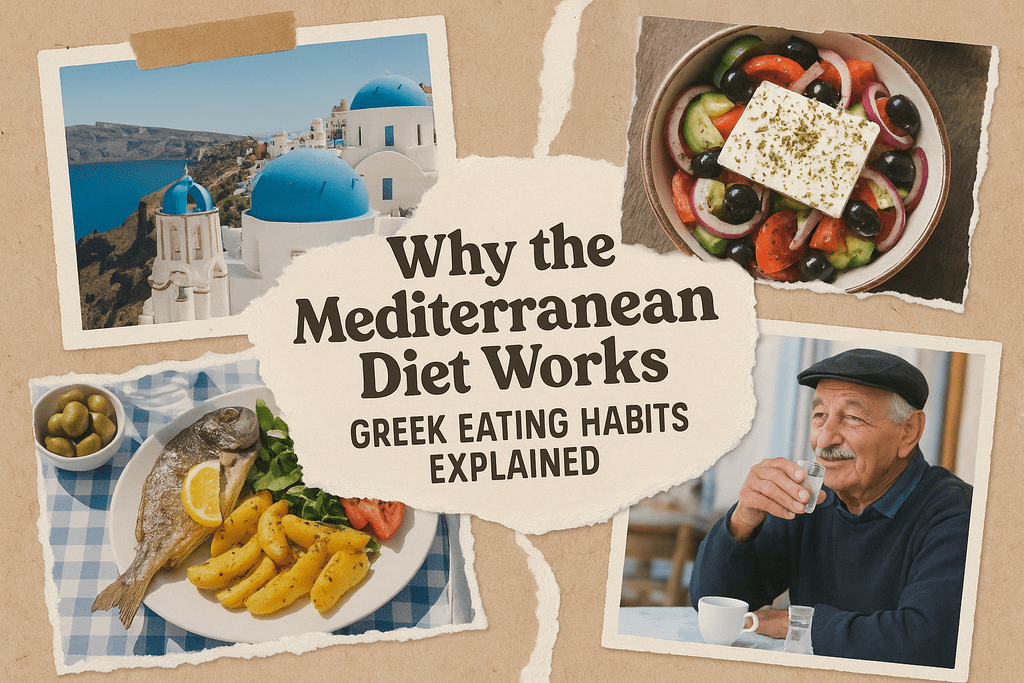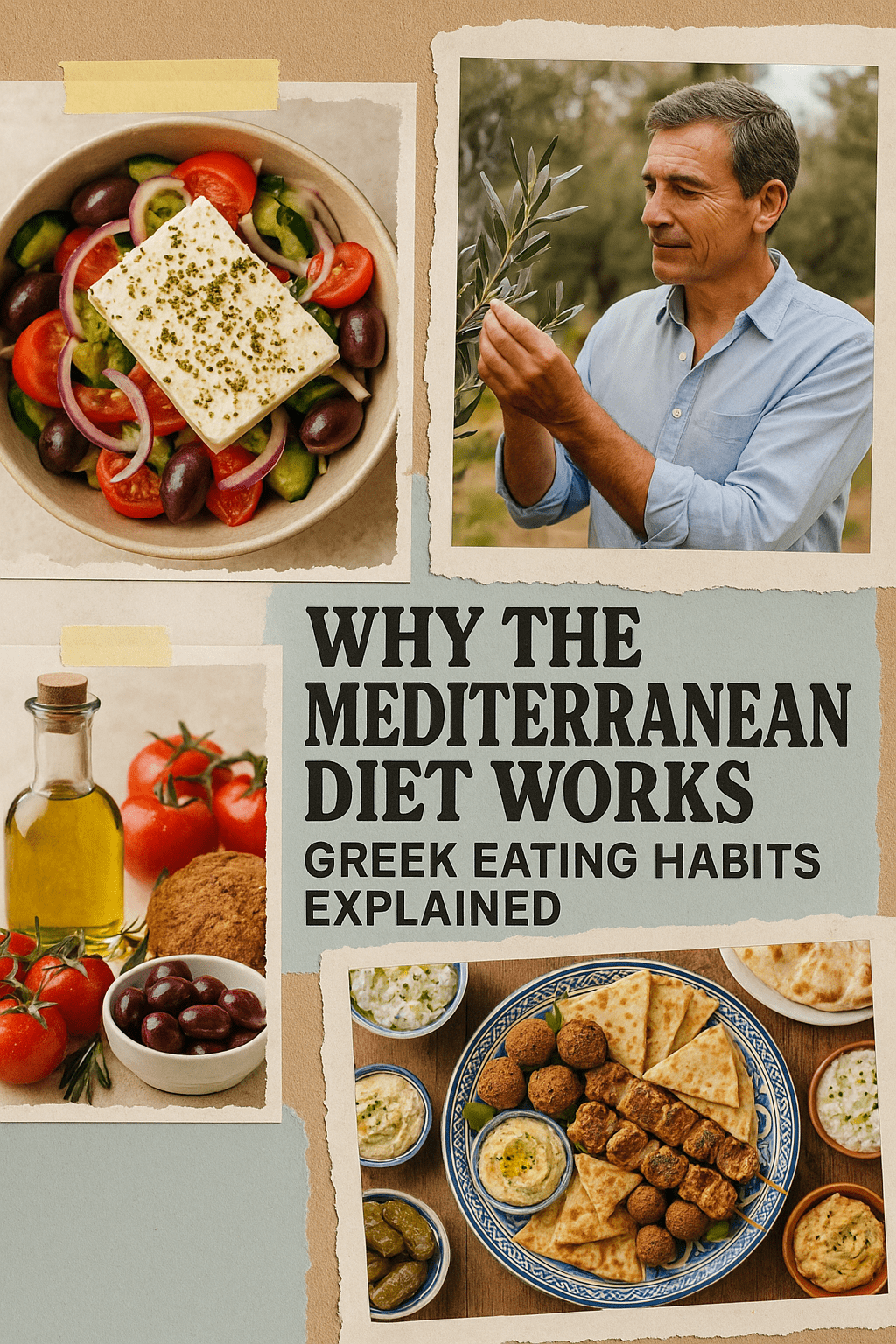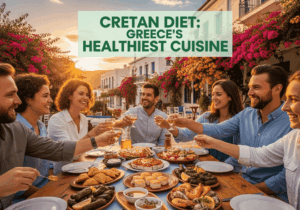Why the Mediterranean Diet Works – Greek Eating Habits Explained
Ever looked at a Greek grandma and thought, “How does she have more energy than me, and I drink three espressos a day?” Yeah, same. There’s something magical about how Greeks eat—but spoiler alert: it’s not magic. It’s the Mediterranean diet. And no, it’s not just about drizzling olive oil like you’re trying to lube a squeaky door.
I stumbled into this lifestyle after a vacation in Crete (don’t worry, I’ll spare you the slideshow), and let me tell you—it changed the way I eat. Not just what I eat, but how. Let’s break it down.
What Exactly Is the Mediterranean Diet?
Alright, let’s clear something up: the Mediterranean diet isn’t about counting calories or surviving on air and lemon water. It’s more of a vibe. A delicious, feta-laced vibe.
Key Components:
- Lots of Veggies: Think tomatoes, cucumbers, peppers, eggplants. Basically, your salad game is about to level up.
- Healthy Fats: Olive oil is king. Butter? Not so much.
- Whole Grains: Bread, pasta, rice—but the wholesome, unprocessed kind. Sorry, Wonder Bread.
- Lean Proteins: Mainly fish and legumes. Red meat takes the backseat.
- Herbs & Spices: Oregano, thyme, mint—flavor without the salt overload.
- Wine in Moderation: Yes, you heard that right. A little vino with dinner. But don’t go chugging it like it’s college again.
Bold claim incoming: You can eat like a Greek and still enjoy your meals without feeling like you’re on a sad, flavorless diet.
It’s Not Just What They Eat, But How
Here’s the kicker: Greeks don’t just eat healthy food. They actually enjoy their food. Like, sit-down-at-a-table-with-people kind of enjoy.
Greek Eating Habits That Make a Difference:
- Meals Are Social Events: Food = family + friends. Ever tried stress eating when you’re laughing with your cousin? Doesn’t really work.
- Slow Eating: No wolfing down a sandwich while driving. Greeks take their time. Turns out, it helps digestion and makes you feel fuller.
- Seasonal Eating: They eat what’s fresh. If it’s not in season, it’s not on the table.
- No Obsession With Diets: FYI, most older Greeks have no clue what “keto” even means.
Ever wondered why that matters? Because eating mindfully, with people you like, and at a table (not in front of the TV) does something amazing: it makes food satisfying. Shocking, right?
Why This Diet Actually Works (Backed by Science, Not Just Yiayia)
Let’s get nerdy for a sec. Studies have shown that the Mediterranean diet can:
- Reduce the risk of heart disease
- Improve brain function
- Lower bad cholesterol (LDL)
- Help with weight management
- Decrease the risk of Type 2 diabetes
And the best part? Unlike restrictive diets (looking at you, cabbage soup diet), this one is sustainable. Because, again, it actually tastes good.
Olive Oil: The MVP of Greek Cooking
If there were an Oscars for ingredients, olive oil would win every category. Best Supporting Fat? Check. Lifetime Achievement in Heart Health? Absolutely.
Why It’s a Big Deal:
- Rich in monounsaturated fats (aka the good stuff)
- Loaded with antioxidants
- Anti-inflammatory properties
- Tastes amazing
I swapped out my cooking oil for extra virgin olive oil, and honestly, I don’t miss the old stuff. Everything just tastes… smoother? Richer? More “Greek island in a bottle“?
Don’t Forget the Beans (Yes, Beans)
Beans might not sound glamorous, but they’re a cornerstone of the Mediterranean diet. In Greece, they’re not a side dish—they’re the main event.
Popular Choices:
- Lentils (fakes soup is legendary)
- Chickpeas (hello, hummus)
- White beans (especially in tomato sauce with herbs—YUM)
Why they matter:
- Packed with fiber
- High in protein
- Super budget-friendly
- Keep you full for hours
Plus, your gut bacteria will throw a party. Just, uh, maybe don’t plan a first date right after.
Fish Over Steak (Most of the Time)
Greeks love their seafood. And no, not the fried stuff you get at beachside tourist traps. Think grilled sardines, octopus, and branzino.
Why It Works:
- Fish = Omega-3s = Happy heart
- Lighter protein = easier digestion
- Pairs well with lemon and olive oil (aka Greek culinary magic)
IMO, nothing beats a simple grilled fish with a side of greens and a squeeze of lemon. Unless it’s followed by baklava. Then all bets are off.
The Secret Sauce: Greek Lifestyle Habits
Eating like a Greek is only part of the equation. You also have to live like one. Or at least fake it ’til you make it.
Lifestyle Habits That Boost the Diet’s Power:
- Daily movement: Walking, gardening, chasing after grandkids. You don’t need a fancy gym.
- Sunshine and fresh air: Greeks spend a lot of time outside.
- Midday naps: The siesta isn’t lazy. It’s strategic. Recharge and conquer the day.
- Stress? What Stress? Slower pace of life = lower cortisol = better health.
Let’s be real: You can’t eat grilled veggies and then doomscroll Twitter for 3 hours and expect miracles.
Why the Mediterranean Diet (Especially the Greek Version) Slaps
So here’s the lowdown, my friend:
- It’s tasty. Like, actually tasty.
- It’s simple. You don’t need fancy ingredients.
- It’s healthy. Backed by decades of research.
- It’s sustainable. No starvation or food guilt.
- It’s cultural. Food + people + joy = yes please.
If you’ve been searching for a way to eat better without turning into a joyless kale-munching zombie, the Greek spin on the Mediterranean diet might be your golden ticket.
Final thought? Eat slow, laugh more, and pass the olive oil. 🙂







